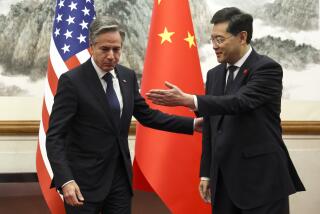U.S. Concedes It Failed to Sway China on Rights Issues : Diplomacy: Beijing’s rebuff of a personal plea from Bush could undermine White House call for further ties.
- Share via
WASHINGTON — Abandoning its efforts to portray Secretary of State James A. Baker III’s visit to China as even a modest success, the Bush Administration acknowledged Monday that it is “very disappointed” by Beijing’s intransigence on human rights.
The failure to make strides on those issues appeared to outweigh small gains on arms matters announced Sunday.
As the White House came under renewed attack from critics for its insistence on openly negotiating with China, an Administration official said that President Bush had made a “personal plea” to Chinese leader Deng Xiaoping for human rights improvements but received nothing in return.
Of particular concern to the Administration has been Beijing’s refusal to discuss the treatment of dissidents, jailed after the flowering of the democracy movement in the spring of 1989.
The human rights appeal came in a letter carried by Baker, in which the President told his “old friend” Deng that it was expected that China would go beyond its previous statements on the issue. The President’s hopes, as expressed in the letter, were dashed, the official said in an unusually gloomy assessment.
Thus, with a Chinese rebuff to show for the ice-breaking trip, the Bush Administration now finds itself in a difficult position. Facing skepticism in Congress about the wisdom of departing from a 2 1/2-year freeze on public, high-level U.S.-Chinese contacts in the wake of the Tian An Men Square massacre, the Administration is left to argue for further direct contact with the Chinese but unable to produce evidence that it pays. The Administration now will be harder pressed in dissuading Congress from limiting China’s access to most-favored-nation trade status.
Meanwhile, Baker’s weekend mission was denounced as a failure by the Independent Federation of Chinese Students and Scholars, representing the 40,000 or so Chinese students at more than 200 U.S. colleges and universities. It also prompted calls for vigilance from Asia Watch, an independent human rights monitoring group.
Amid the dark interpretations, there was one small reason to hold out hope that the trip had accomplished some of its goals: China customarily waits a long time--often months--before responding to the sort of pressure Baker was applying.
Speaking publicly, senior officials were reluctant to express anger that China had let Baker return almost empty-handed.
Vice President Dan Quayle said that Baker delivered “a very direct message” and that “China has got to understand that the world has drastically changed in the last couple of years, that human rights are on the front burner, not the back burner.”
But, he said in a lunch interview, America cannot afford to ignore China, regardless of its response to concerns about human rights, nuclear proliferation and trade matters involving copyrights and use of prison labor. Another official maintained that China’s pledge, for the first time, that it would observe the Missile Technology Control Regime, which limits exports of ballistic missiles, could be considered a success. He also argued that China’s decision to give America some details about those on a list of about 800 political prisoners could be considered a positive result.
Among members of Congress focusing on China, there was little support for the Administration approach--and skepticism of its results. Rep. Stephen J. Solarz (D-N.Y.), chairman of the House Foreign Affairs subcommittee on Asian and Pacific affairs, said: “The Chinese appear to have gained more in legitimizing their regime than we did in advancing human rights.”
Meanwhile, Chinese officials and the U.S. Embassy reported that outspoken journalist and political dissident Dai Qing, apparently detained after the U.S. Embassy contacted her about meeting with Baker, is free. But Dai’s family said her whereabouts were still unknown early today.
Times staff writer Robert Shogan contributed to this story.
More to Read
Get the L.A. Times Politics newsletter
Deeply reported insights into legislation, politics and policy from Sacramento, Washington and beyond. In your inbox twice per week.
You may occasionally receive promotional content from the Los Angeles Times.










